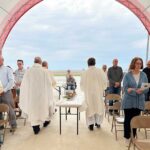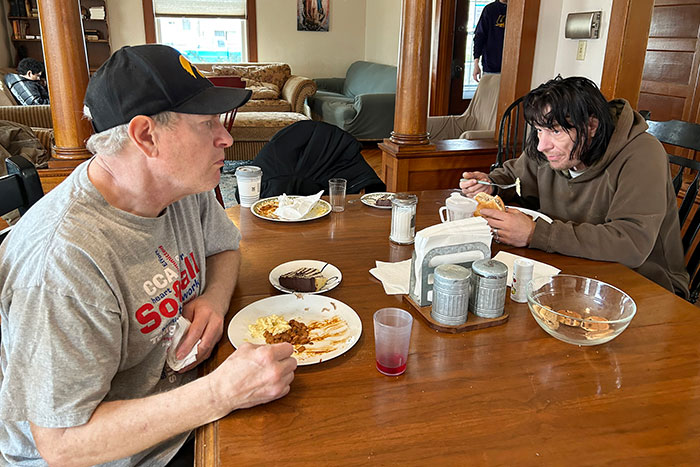
Guests Alan Heaberlin, left, and Patrick Schultheis enjoy a meal April 7 at the Iowa City Catholic Worker House on Sycamore Street. A fundraiser for the ICCWH will be held April 30 from 5:30-7 p.m. at St. Patrick Parish in Iowa City.
By Barb Arland-Fye
The Catholic Messenger
IOWA CITY — Caine Thomas is in the kitchen at Iowa City Catholic Worker House on Sycamore Street, making sandwiches with pulled pork he prepares for the hungry guests in the dining room. Core volunteers Teri Berg and Maureen Vasile are overseeing the meal service, moving back and forth between the dining room and kitchen on Palm Sunday morning.
Conversation fills the dining room. “It’s almost like home,” says Alan Heaberlin, a newcomer who saw a flyer about the Catholic Worker House at the shelter where he is staying in Iowa City. “The food is great.” He also appreciates the availability of a hot shower. “I love it,” says Patrick Schultheis, a regular for the Sunday meal. “I try to introduce people who are new to Iowa City to it.”
Alonzo Perry, another regular guest, says, “It’s a good place, safe place, good people … I came here hungry; I left full.” Disabled Air Force veteran Jason Rushton describes the Iowa City Catholic Worker House as “definitely outstanding. The people are helpful, the food is excellent.”
Volunteers prepare and serve meals on Sundays from 11 a.m. to 2 p.m., and 8-10 a.m. Tuesdays and Thursdays and dinner from 4-7 p.m. on Saturdays, said Kim Novak, a volunteer and board member with the Iowa City Catholic Worker. “We’re trying to fill in gaps where no other meal services are available,” says Novak, who volunteers with her husband, Tom.
The Iowa City Catholic Worker’s mission is to feed the hungry, house the homeless and welcome the refugee. Its programs meet the immediate survival needs of individuals and families and trains new grassroots leaders to identify the social, political and economic issues impacting their lives. It is part of the Catholic Worker Movement, which Dorothy Day, a champion of the poor and advocate for social justice, co-founded in 1933. She is a Servant of God, the first step in the cause for sainthood.

David Goodner and Emily Sinnwell co-founded the Iowa City Catholic Worker in 2016, which operates its refugee resettlement, soup kitchen and drop-in center programs without paid staff time. All revenue goes toward the physical infrastructure at the Catholic Worker’s twin houses (the second house opened last year) of hospitality, food, utilities,
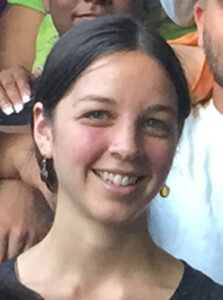
household items, and other bread-and-butter staple products and expenses.
Funding comes from individual contributors ($185,000), events ($15,000), churches and businesses ($50,000), USDA Farm and Food Workers Relief program grant ($137,000) and a Department of Public Health (DPH) Pandemic Mitigation Grant ($120,000). Its Fiesta Fundraiser on April 30 at St. Patrick Parish in Iowa City is a crucial piece of the funding pie, Kim and Tom Novak said.
The houseguests
At present, 19 guests live at the house on Sycamore and 14 live at the second house on Johnson Street. Of the 33 guests, 14 are children. “Most of our current guests are immigrants and refugees, many from Central and South American countries, including Guatemala, Honduras, Venezuela, Columbia and Mexico,” Kim Novak says. “In the past, we’ve also had refugees from Congo, Rwanda and El Salvador.”
Most of the current houseguests “have had a good deal of physical, psychological and emotional trauma prior to and during their journey to the United States. Unfortunately, there is not a robust program in this area for housing or providing services to this group of individuals,” she said. “All of our adult guests are currently employed, many of them in jobs that have irregular/unpredictable hours. They work physically difficult jobs such as roofing, framing or hotel cleaning and are at risk of wage theft, workplace safety violations and being laid off without notice.”
Hondurans Franklin Ariel Martinez and his wife, Wendi Mariala Ramirez, are among the employed. He frames houses and she works as a hotel housekeeper. On Palm Sunday, Franklin was caring for their two young daughters, Fernanda and Solanyi, while his wife was working. They appreciate the Catholic Worker House’s hospitality, he said (Kim Novak interpreted) but there are challenges to living with 19 people in the same house.
“It is the normal tensions of living with people,” Novak said. “The fact that (the houseguests) are immigrants doesn’t change the fact that they have their own personalities. We’re trying to
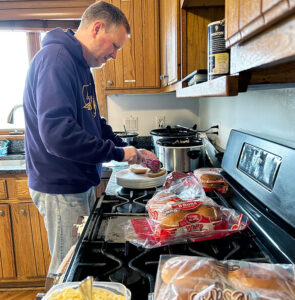
Volunteer Caine Thomas prepares pulled pork sandwiches for guests in need at the Iowa City Catholic Worker House on Sycamore Street.
acknowledge the spiritual, emotional and psychological issues people have … it requires a lot of volunteers. It’s a heavy lift for any one person, so it takes a team.”
The Iowa City Catholic Worker has “hundreds of volunteers who help give legs to our community,” she said, but more are always welcome. “We have many different opportunities to help and we have no paid employees. Our meal program has a core group of 12 individuals that cover our open hours. We couldn’t run the meal program without the dozens of food providers (individuals, church and youth groups, etc.) who prepare and often stay to serve the food.”
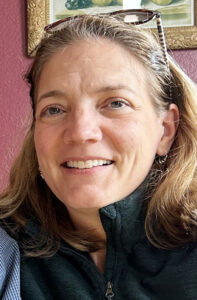
Volunteers also provide rides for the houseguests to immigration appointments, doctors’ appointments and soccer practices, for example. Still others tutor, provide a fun activity or help with yard work. “We are always grateful for Knights of Columbus, the Newman Catholic Student Center and youth groups that help keep our houses in good shape,” Kim Novak said.
The fiesta “will be our greatest source of income this year,” she added. Other funding sources — financial, in-kind or service — come from parishes, some of their Social Action groups, Knights of Columbus and youth groups. “We feel well supported and encouraged by many of our clergy and by Bishop Thomas Zinkula. We are also so very grateful to the many women religious groups in the area that have consistently supported us financially and spiritually.”

“When you look at Catholic Social Teaching, the essence of it is trying to find a connection to the marginalized,” said Tom Novak, a retired physician. He felt called to provide direct, hands-on service through the Iowa City Catholic Worker, which makes that connection to the marginalized. He oversees a monthly foot clinic, where he has the privilege of hands-on service, literally. For some of those getting their feet examined or their toe nails clipped, “this is the first time someone has physically touched their bodies” in years, Tom Novak said. “It’s recognizing their humanity in some small way.”
Fundraising opportunities
What: Iowa City Catholic Worker Houses Fiesta Fundraiser 2023
When: April 30, 5:30-7 p.m.
Where: St. Patrick Parish, Iowa City
Details: Live music, Mexican food and drink, silent auction
Cost: $20/person and $50/family
Other fundraising opportunities: Make tax-deductible donations to the Iowa City Catholic Worker’s donor-advised fund through the Community Foundation of Johnson County.










